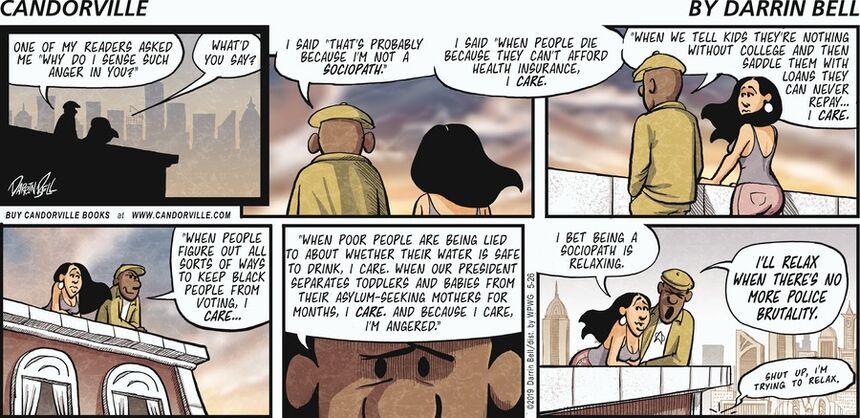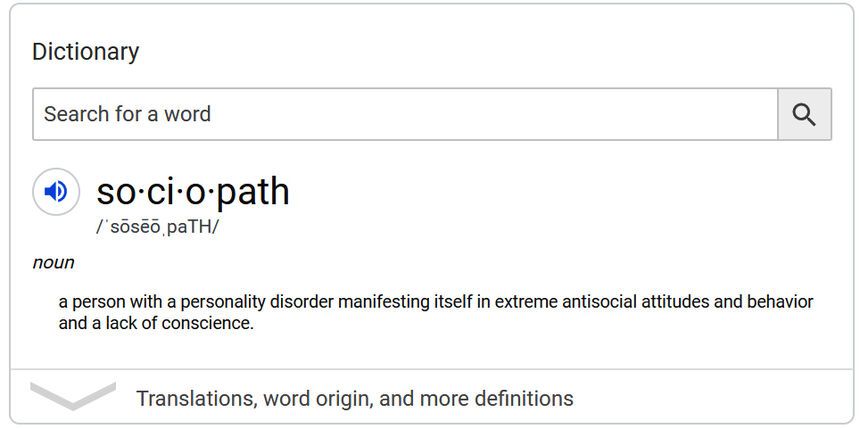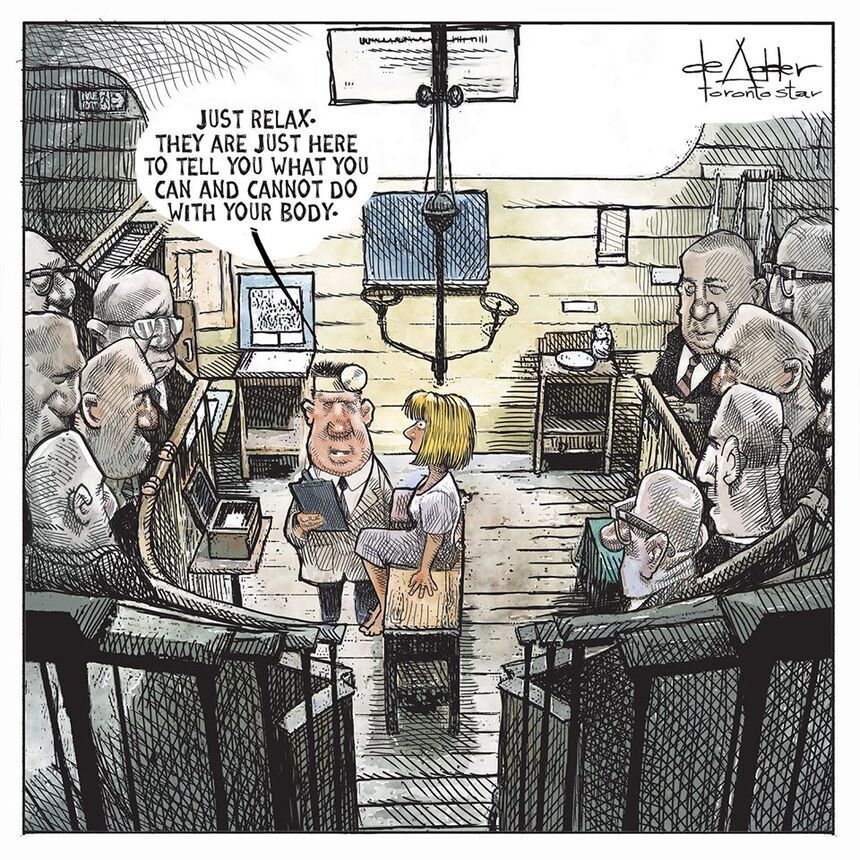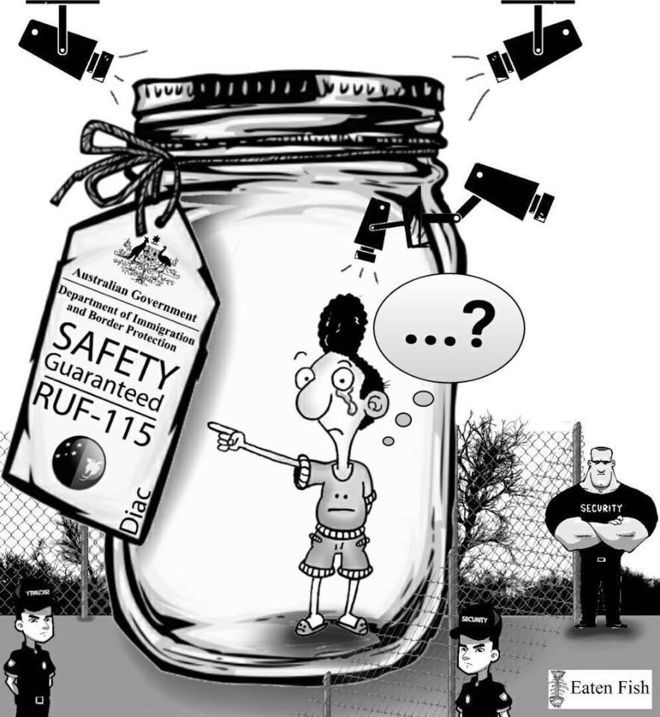CSotD: Continental Issues
Skip to commentsLemont lays it all out in this morning’s Candorville, and it’s nice to not have to parse through metaphors and symbols for meaning.
Really, if you’re not angry, and scared, and fed up with the current state of things, he’s right: You’re a sociopath.
And note that he’s not complaining about how the increasing system of injustice impacts him.
And yet it does.
There is a John Donne element to living not an ideal life or a perfect life, but simply a decent one, in which no man is an island but, rather, part of the greater continent, such that “any man’s death diminishes me, because I am involved in mankind.”
You don’t have to be an activist. You don’t even have to be terribly outgoing: There have been hermits who shut themselves off from the world, not to avoid people but to avoid pain.
Michael de Adder also speaks directly and with only a visual exaggeration as his metaphor in addressing the utterly inappropriate, sociopathic preoccupation at the base of the movement to restrict women’s autonomy.
You could argue that that you are caring for others, exercising social awareness, in wanting to create a world in which unborn children are protected, and there are people for whom that is true.
But the newest laws against terminating a pregnancy rely on the concept that a fertilized egg, an embryo, is a life that must be protected and brought to term, yet carve out an exception for the embryos created, and abandoned, in the process of in vitro fertilization.
Thus their interest in embryos begins not at fertilization but at the point in which it becomes temporarily part of a woman’s body. Their interest is not in preserving other lives, but in controlling others’ lives.
Which they proceed to demonstrate by not giving a damn about anyone’s well-being once it is no longer attached to a woman’s uterus.
As Walt Handelsman points out, those who honestly care about life are not a majority among those who simply want to control other people.
Many have pointed out that the governor of Alabama who signed that horrendous “pro-life” law has apparently had no qualms in killing people herself, claiming that her state’s reverence for life makes it necessary to murder those who do not share it.
Terrorists and assassins could explain their actions with the same justification, but the greater point in Handelsman’s lists is that being socially aware goes beyond the binary issue of life and death and includes sustaining a world in which life can not only exist but flourish.
A decent person might wish for power in order to advance a society in which each person is given the best possible chance to live their best possible life, but a sociopath simply wishes for power for its own sake, and is willing to trample on others to elevate himself.
As Ed Hall suggests, this includes denying the dignity of other races and the opposite sex in order to maintain your own control and that of your fellow sociopaths who cannot find ways to succeed in life except by disadvantaging others.
And, as Dave Granlund points out, this can mean catering to the mob, no matter how barbaric and misguided its instincts may be.
Don’t blame this on Trump alone: The entire concept and system of law was instituted to control the natural instinct for seeking revenge and engaging in endless vendettas, and to level the playing field so that privilege did not provide an undue, immoral, sociopathic advantage.
We have, in recent decades, gradually degraded that principle.
We can take that back as far as the beginning of “victims’ statements,” in which articulate people are permitted to increase the punishment of those with lesser resources and less articulate voices, and of those whose crimes were committed against the more privileged, such that taking the life of a promising college student or a loved spouse is judged to be worthy of more punishment than taking that of a homeless person or an addict.
Decent societies do not make that sort of distinction, but we have enacted laws specifically to do so, long before we put a man in power who believes that murdering a schoolgirl at random is not a crime, so long as she is wearing a hijab, and killing an old man is all right, if he speaks a language other than English.
It is, after all, only an extension of a policy that considers revenge a reasonable factor in determining sentences, rather than something which should be neutralized in the search for true and equal justice.
Nor, Mike Luckovich observes, is our current system of catering to the mob confined to restoring barbarism on the battlefields and in the prisons.
Truth and power are intertwined to the point where those who lead are charged not with carrying out the law but with determining what it shall be, not because they are wise but because they are powerful, and they surround themselves with jackals who are happy to scavenge the scraps they leave behind.
Even when it is clear that, as Mike Smith points out, their Dear Leader has no interest in true justice and no loyalty to the greater good of the nation, and is solely motivated by the need to cling to power …
… and, as Mike Thompson notes, is willing to partner with whoever will best reward him, empower him and ignore his sociopathic tendencies, even when others have turned him away, and even at the risk of their own long-range interests, so long as they gain short-range advantage.
Enough wallowing in the gutter
Go elevate yourself with Eaten Fish’s cartoons and text as he tells the story of his time in an Australian refugee camp and how the Cartoonists’ Rights Network International and its members and allies helped to free him and bring him to safety in Norway.
This is how decent people reach out to advance the goals of a sane and healthy civilization.









Comments 2
Comments are closed.